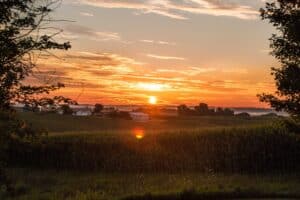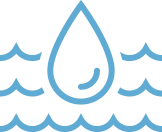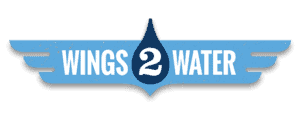Get to know Rebekah Jones
In a small town in eastern Iowa, Rebekah Jones grew up connected to the agriculture community while also spending her summers on the water – swimming, tubing, and waterskiing at Lake Delhi. She remembers the boat her parents bought, as well as the time spent on the farm with her dad. One day, he “got down on his knees to pick up a handful of soil and was telling me what kind of topsoil we had and why it was so important to nourish the crop,” she says.

Rebekah’s dad closes the gate at a nearby rental farm where cattle graze.
When looking for a job a couple years ago, she knew, “agriculture interested me, but environment has always interested me as well.” That made the Communications Director position at the Iowa Agriculture Water Alliance (IAWA) a natural fit. “When I started at IAWA, it did feel right and brought me full circle with my upbringing being on a farm and having interests in water quality.”

Learning at an ISU field day about how different conservation tillage impacts the soil.
IAWA was founded in 2014 with the mission statement: “To increase the pace and scale of farmer-led efforts to improve water quality in Iowa.” They focus on leading conversations, bridging groups, and supporting water-quality initiatives in the state.
Today, Rebekah’s role often includes promoting the intersection between agriculture and conservation. One of the biggest challenges, she says, “is informing farmers that you can have a profitable operation and you can have conservation. Sustainability and profitability do coexist and can often complement each other.” While it is possible to have these simultaneously, she recognizes that it means something different to every person. “Different parts of the state have different soil types, and different farms are growing different commodities.” Plus, she’s constantly considering how timing implications, climate changes, and weather variabilities are becoming “increasingly important, too.”

Reporting on Mobile Bay. In Alabama, Rebekah covered hurricanes, litter traps in the water, and the BP oil spill. The Gulf ultimately gets Iowa and others’ upstream water problems.
In joining Wings2Water (W2W), Rebekah is excited to see the messaging spread. “One of the great things about W2W is getting to inform a more general population about the issues we have, the needs we have, and the solutions that can be put into place,” she says. Whether urban or rural, a majority of community members go to the airport(s) and travel. With W2W, all travelers and guests are exposed to information about water quality and its importance. Rebekah envisions that the message spreads when travelers “take that information back to their own community and have ideas for how they can make a difference in their own home.”
Now the biggest push is to see more airports onboard. “Knowledge is power,” Rebekah adds, and we can “expand our messaging and education so that more people understand our water quality needs and how it impacts them.” And perhaps the most important part of that is realizing that “we all must work together. The problems and solutions are everywhere, and we have to work together. If we don’t have clean water, we’ll only end up with far greater issues in the future.”

The view from the front porch of the home Rebekah grew up at in Hopkinton, Iowa.





